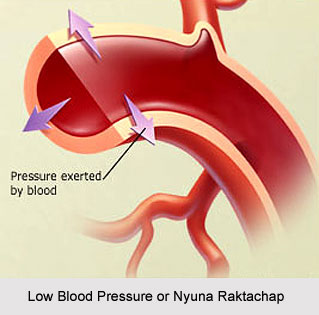 If the pressure of the blood being pumped by the heart into the arteries falls below the average 140 i.e. systolic and 80 i.e. diastolic, there may be increase in the pulse rate. Cold sweats, and a feeling of extreme weakness and giddiness can be experiences as a result.
If the pressure of the blood being pumped by the heart into the arteries falls below the average 140 i.e. systolic and 80 i.e. diastolic, there may be increase in the pulse rate. Cold sweats, and a feeling of extreme weakness and giddiness can be experiences as a result.
Low blood pressure or hypotension is pressure that is so low that it causes symptoms or signs due to the low flow of blood through the arteries and veins. When the flow of blood is too low to deliver enough oxygen and nutrients to vital organs such as the brain, heart, and kidney, the organs do not function normally and may be permanently damaged. Unlike high blood pressure, low blood pressure is defined primarily by signs and symptoms of low blood flow not by a specific blood pressure number. Some individuals may have a blood pressure of 90/50 with no symptoms of low blood pressure and therefore do not have low blood pressure. However, others who normally have high blood pressure may develop symptoms of low blood pressure if their blood pressure drops to 100/60.
People who have lower blood pressures have a lower risk of stroke, kidney disease, and heart disease. Some other persons in the group can be mentioned as athletes, people who exercise regularly, people who maintain ideal body weight, and non-smokers tend to have lower blood pressures. Therefore, low blood pressure is desirable as long as it is not low enough to cause symptoms and damage organs in the body.
Causes and Symptoms: Low blood pressure may be caused by different reason and knowing of all of them is equally important to eradicate the disease. Some of them can be mentioned as injury leading to loss of blood, food poisoning, acute or chronic anaemia, and other disorders. If the pressure remains a little lower than the average, it is a healthy sign, because in moments of stress, the heart will be able to deal with any emergency. But if it falls below the minimum necessary for sound health, it should cause worry. The first requirement is to ascertain the cause of the malady. If it is anaemia or sudden loss of blood, these conditions should be treated first. Severe blood loss, as in an injury, may necessitate transfusion of blood. Low blood pressure due to anaemia can be cured only when the persistent lack of blood in the system has been dealt with. For persistent cases of low blood pressure, the medicines mentioned in the section dealing with anaemia should be administered. Ayurveda maintains that low blood pressure is caused by vitiation of vayu and can be treated by drugs, which restore the balance of this dosha in the body.
Home Remedies: Administration of brandy or alcohol of any variety in quantities from 15 to 50 ml, diluted with warm water, is a temporary expedient, which can be tried till the exact cause of the malady is ascertained.
Diet and Other Regimen: A patient suffering from low blood pressure should be given a balanced nutritious diet. The diet should be full of proteins and carbohydrates. Dry fruits, cheese, flesh of chicken, pigeon, rabbit, and goat all in that order. Soups of meat and black gram, fruits such as mangoes, bananas, apples, grapes, and leguminous vegetables, such as beans of all varieties, should be the mainstay of the diet of a patient suffering from chronically low blood pressure. As a whole it can be said that in low pressure people should eat healthy and should not take any sort of tension.
The patient should avoid vigorous exercise and excessive sex. Intoxicants like alcohol and tobacco may be permitted in moderate quantities.




